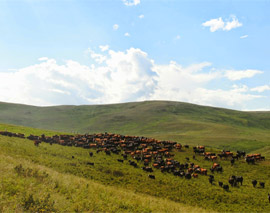Biodiversity Assessment of Alberta's Beef Industry
This collaborative research project is assessing the impacts of beef production on biodiversity in Alberta.

About the Project
At present, the relationship between beef production and biodiversity is complex and poorly understood. To understand the relationship between beef and biodiversity in Alberta, the ABMI is partnering with researchers from the University of Alberta, the Government of Alberta, and Agriculture and Agri-Food Canada on a new collaborative project. Sponsored by the Alberta Livestock and Meat Agency, this three-year research project explores the impacts of beef production on biodiversity in Alberta’s pastures and rangelands.
This project is aligned with current efforts in Canada to assess the sustainability of Canada’s beef sector, led by the Canadian Roundtable for Sustainable Beef. Globally, the United Nation’s Food and Agriculture Organization (FAO) commissioned the Livestock Environmental Assessment and Performance (LEAP) Partnership in 2012 to develop metrics and methods for assessing the impact of the livestock sector on biodiversity. ABMI contributed information on the design of its environmental monitoring program to the LEAP work, which is intended to result in a better understanding and management of the key factors influencing the sector’s performance.
The ABMI is well positioned to assess biodiversity response to beef production, having surveyed over 200 grazed sites in the grassland and parkland natural regions of Alberta to date through its long-term monitoring program.

Our Approach
The project uses existing biodiversity data collected as part of the ABMI’s long-term monitoring program, as well as spatial land cover information from ABMI’s Geospatial Centre, Alberta Environment and Parks, and other sources, to assess observed biodiversity patterns in relation to different land cover and management factors in Alberta’s grazing lands. Information on grazing regimes will be collected by conducting producer surveys about grazing management practices.
The project also uses existing rangeland health inventory data and will be collecting new rangeland health data in order to examine how biodiversity data relates to assessments of rangeland health.
Project Impact
These analyses will enable the project team to develop a framework and methodology for incorporating biodiversity assessment into a life cycle analysis of the beef industry in Alberta. The knowledge gathered through this project will provide insight into the beef sector’s influence on biodiversity at multiple spatial scales.
By evaluating the positive and negative impacts of beef production on biodiversity, the project can assist in identifying management practices that benefit biodiversity in beef production systems.
Questions? Feel free to contact:
Monica Kohler
Acting Co-Director of the Application Centre
587-390-8709
mkohler@ualberta.ca